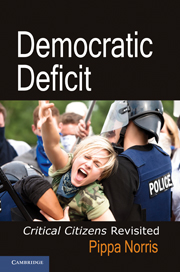Book contents
- Frontmatter
- Contents
- List of Tables
- List of Figures
- Preface and Acknowledgments
- PART I INTRODUCTION
- 1 Democratic Hopes and Fears
- 2 The Conceptual Framework
- 3 Evidence and Methods
- PART II SYMPTOMS
- PART III DIAGNOSIS
- PART IV PROGNOSIS
- 12 Conclusions and Implications
- Technical Appendix A Concepts and Measures
- Technical Appendix B Countries in the Pooled World Values Survey, 1981–2007
- Technical Appendix C Methods
- Notes
- Selected Bibliography
- Index
3 - Evidence and Methods
Published online by Cambridge University Press: 05 June 2012
- Frontmatter
- Contents
- List of Tables
- List of Figures
- Preface and Acknowledgments
- PART I INTRODUCTION
- 1 Democratic Hopes and Fears
- 2 The Conceptual Framework
- 3 Evidence and Methods
- PART II SYMPTOMS
- PART III DIAGNOSIS
- PART IV PROGNOSIS
- 12 Conclusions and Implications
- Technical Appendix A Concepts and Measures
- Technical Appendix B Countries in the Pooled World Values Survey, 1981–2007
- Technical Appendix C Methods
- Notes
- Selected Bibliography
- Index
Summary
What benchmarks and indicators are appropriate to monitor and compare the health of democratic governance? If the majority of Americans express dissatisfaction with the performance of the federal government, for example, does this signal deep anger and disaffection among the public or just routine mistrust? If only one in five British citizens expresses confidence in Westminster politicians, in the wake of the 2009 MP expenses scandal, is this a signal that something is seriously wrong with parliament – or does this just reflect healthy skepticism toward authority figures? If two-thirds of Italians persistently lack confidence in the courts and judiciary, this may appear problematic compared with typical attitudes in Scandinavia, but what is the appropriate yardstick? Are Italians too cynical? Are Scandinavians perhaps too trusting? We should recognize that legitimate interpretations can and do differ, on both normative and empirical grounds. Democratic theories offer alternative visions about these matters, without any yardsticks etched in stone.
To understand these issues, the technical detail and research design used for this book need clarification, including how the fivefold conceptual schema delineated in the previous chapter is operationalized and measured, before the evidence can be interpreted. This chapter therefore describes the primary data sources for analyzing public opinion, including the comparative framework and the classification of regimes for the societies included in the pooled World Values Survey 1981–2005, used as the main dataset for global cross-national comparisons, as well as the Eurobarometer, employed for the annual time-series analysis from 1972 to 2008.
- Type
- Chapter
- Information
- Democratic DeficitCritical Citizens Revisited, pp. 38 - 54Publisher: Cambridge University PressPrint publication year: 2011



